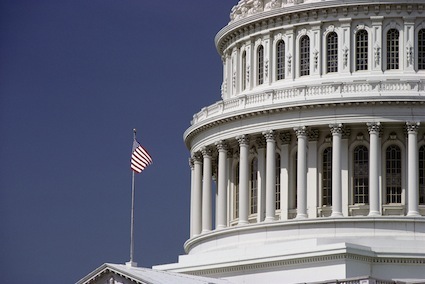Bills Prompt Faceoff Between Big Tech, Antitrust Groups
One side’s innovation is another's economy-killer

The smarter way to stay on top of the streaming and OTT industry. Sign up below.
You are now subscribed
Your newsletter sign-up was successful
Big Tech and antitrust enforcement activists are squaring off over a couple of bipartisan bills in Congress meant to address the size and power of tech giants like Facebook, Amazon and Google.
They made their opposing views known in dueling letters to congressional leaders considering the new legislation.
The bills under discussion are the American Innovation and Choice Online Act, which does not allow large online platforms to “preference to their own products on the platform, excluding or disadvantaging competing products from another business on the platform, or discriminating among similarly situated users;” and the Open App Markets Act, which would prevent affected companies from restricting the use of alternative in-app payments systems; from favoring their own terms of distribution, pricing or conditions of sale; or from penalizing developers for using different pricing terms or conditions via another in-app payment system. That bill would prevent Google or Apple, for example, from using information derived from a third-party app to compete with that app.
Among the groups backing both bills are Consumer Reports, the Main Street Alliance, the Center for American Progress and Public Citizen. They say the bills would be “prohibiting dominant Big Tech platforms from anti-competitive discrimination, self-preferencing and excluding competitors to protect their monopolies and leverage them into other lines of business.”
Taking an opposing stance are the Consumer Technology Association, the Computer & Communications Industry Association, TechNet and others. Their members include the large platforms targeted by the bills as well as smaller platforms that argue they would also be hurt. In a joint letter to lawmakers this week, those groups said the bills would cost the U.S. economy up to $319 billion, costs borne by consumers and businesses through higher costs and lost value of services.
On the other side, the bills’ opponents said a study found “no quantifiable benefits” to the bills for either consumers or small business. “We urge lawmakers to fully consider the harmful effect of this legislation, and to oppose regulations that would harm consumers, undermine American innovation, and damage the U.S. economy,” they wrote.
Both Republicans and Democrats are concerned over Big Tech, and the measures have backers on both sides of the aisle. Generally, Democrats are more inclined to pass tougher antitrust laws and to boost enforcement as a way to prevent large platforms from buying up to monopoly or otherwise using their size anticompetitively. Republicans are more focused on ways to rein in the power of social media sites to moderate platforms in ways seen as censoring conservative content. Both agree on the need for some kind of governor on Big Tech conduct.
The smarter way to stay on top of the streaming and OTT industry. Sign up below.
The legislative salvos against Big Tech come as the Justice Department and Federal Trade Commission are asking for input on whether and how they should change their merger guidelines to capture what they see as Big Tech's history of buying up to monopoly by gobbling up startups before they’re large enough to trigger antitrust scrutiny.
Deals below a certain dollar value can get early termination of their antitrust reviews, one of the matters Justice and the FTC are also revisiting.
Computer companies argue the current merger guidelines are “valuable and adequate.” ▪️
Contributing editor John Eggerton has been an editor and/or writer on media regulation, legislation and policy for over four decades, including covering the FCC, FTC, Congress, the major media trade associations, and the federal courts. In addition to Multichannel News and Broadcasting + Cable, his work has appeared in Radio World, TV Technology, TV Fax, This Week in Consumer Electronics, Variety and the Encyclopedia Britannica.

